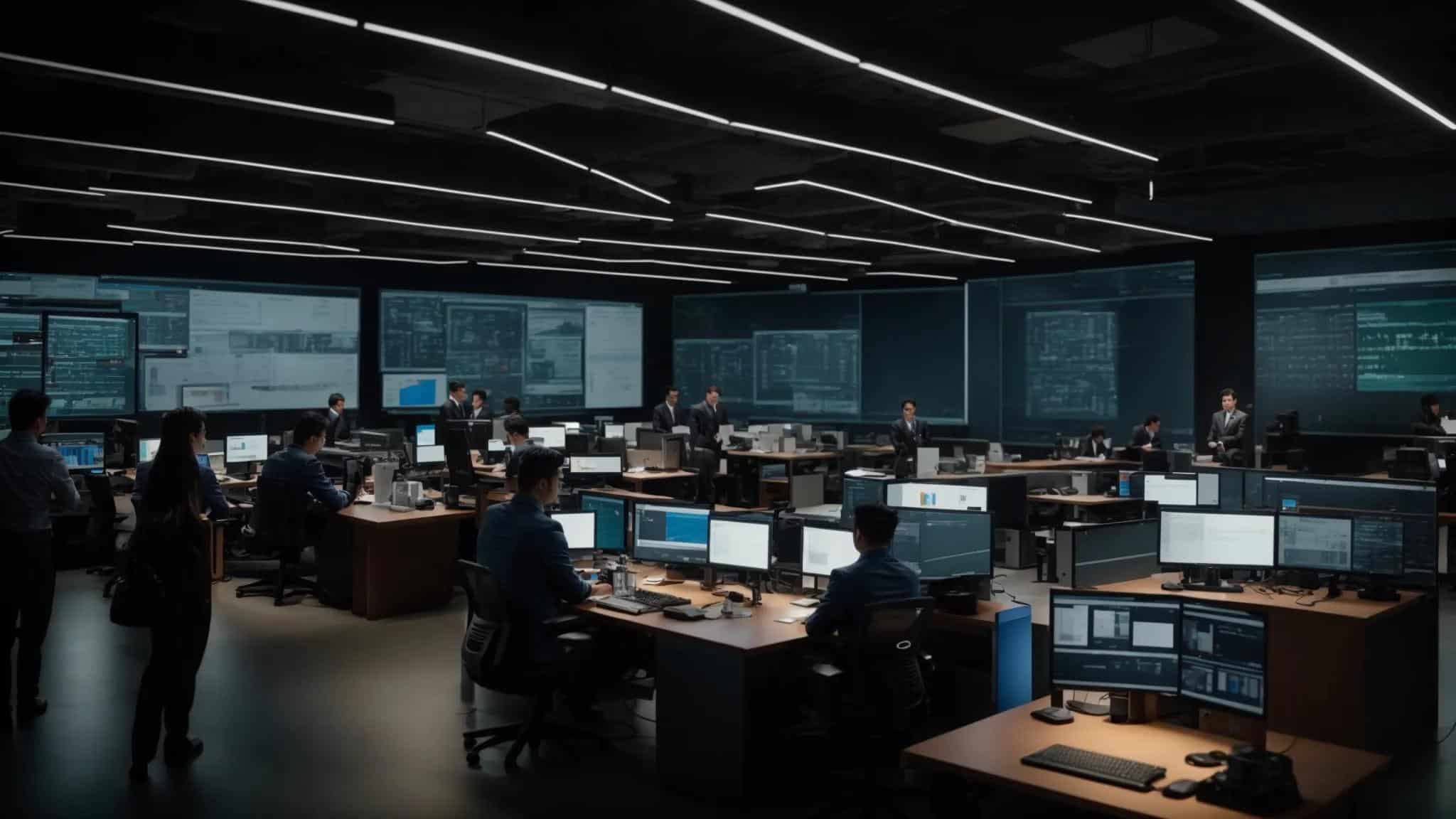Finding IT Managed Service Providers That Boost Business Growth


How Does Contracting Cyber Command for IT Managed Services Improve Business Success?
In today’s fast‐paced business environment, small and mid companies are facing ever‐growing technical challenges—from network monitoring and data security to cloud computing and infrastructure management. With the rising threat of cyberattacks and the complexities of emerging technologies, partnering with a trusted managed service provider (MSP) is more critical than ever. Cyber Command, an IT support expert servicing Orlando, Winter Park, Altamonte Springs, Winter Springs and surrounding areas, offers comprehensive IT managed services designed to ensure seamless productivity, reduce downtime, and improve overall business performance. In this article, as noted by venturebeat, we will answer key questions about the criteria for selecting top IT managed service providers, the trends reshaping the MSP sector, the importance of technological capabilities, the role of case studies in demonstrating business success, the service offerings and strategies of leading providers, and the methods for evaluating performance metrics. As a small business owner considering outsourcing IT assistance, you will discover how Cyber Command’s expert support and long-term approach can enhance your operational efficiency and profitability.
Cyber Command collaborates closely with each client to ensure that all technology resources—from software and hardware procurement to routine customer support and cybersecurity—are tailored to the unique needs of the business. We provide on-site support and proactive maintenance, using strategic planning and modern automation tools to solve complex IT challenges. Integrated IT solutions not only lower operational expenses but also secure data and boost customer satisfaction. With this in mind, let’s address the critical aspects that should be evaluated when considering whether to contract an IT managed service provider.
How Do You Select the Right IT Managed Service Provider for Business Success?

The first step in minimizing IT-related disruptions is selecting the right managed service provider. The primary criteria for selecting a top IT managed service provider include a proven track record in network monitoring, robust managed security services, and comprehensive cloud computing support that covers Microsoft Azure, broadband, and backup systems. Cyber Command, for example, demonstrates expertise in managed IT services by prioritizing rapid incident response, transparent pricing, and cutting-edge strategies to reduce downtime and improve operational efficiency.
When assessing providers, consider the following characteristics: – Experience and Reputation: Look for providers with years of experience and a strong reputation for customer support, such as Cyber Command’s long-standing relationships with local businesses. – Comprehensive Service Offerings: Ensure that the provider offers a full range of services including managed network services, endpoint protection (e.g., antivirus software and firewall management), backup and recovery solutions, and data breach prevention measures. – Scalability and Flexibility: The provider should offer scalable solutions that can grow along with your business needs, supporting integration with legacy systems and emerging technologies. – Performance Metrics and Service Level Agreements (SLAs): Choose providers that offer clear performance metrics such as uptime guarantees, response times, and incident resolution data. Cyber Command’s SLAs are designed to minimize disruptions and ensure a consistent return on investment. – Security and Compliance: With increasing regulatory requirements around data protection (e.g., HIPAA, GDPR), the provider must have robust security measures, including vulnerability assessments, patch management, and endpoint detection and response.
A careful assessment of these criteria ensures that you partner with an MSP that not only solves immediate issues but also contributes to your long-term business growth.
What Trends Are Reshaping the IT Managed Service Provider Sector?

Modern IT environments are evolving rapidly, with several trends influencing how MSPs deliver their services. One of the most significant trends is the increased adoption of cloud computing platforms, such as Microsoft Azure, which provide scalable and cost-effective infrastructure management. Another trend is the growing emphasis on cybersecurity, where managed security service providers (MSSPs) are implementing advanced measures like firewall management, antivirus software, and endpoint detection and response to protect sensitive data.
At Cyber Command, we have embraced these trends. For instance, our platform integrates cloud management with proactive network monitoring, ensuring that our clients’ data loss and downtime are minimized. Moreover, the rise of automation and artificial intelligence in IT service management has enabled providers to offer predictive maintenance solutions and faster incident resolution. This not only supports improved system usability but also enhances governance and regulatory compliance.
Additional trends include: – Increased Mobility and Remote Access: With the expansion of remote work, MSPs are offering now unified communications, secure VPN access, and remote troubleshooting services. – Data Analytics and Performance Monitoring: Advanced analytics tools are now used to monitor IT infrastructure in real time, allowing businesses to make data-driven decisions about resource allocation and risk management. – Managed Security Services Integration: Combining traditional IT support with cybersecurity frameworks has become a standard approach, reducing vulnerability to cyberattacks. – Outsourced IT Support Models: Small businesses are increasingly outsourcing IT management responsibilities to focus on their core business operations, a trend that Cyber Command actively supports by providing bespoke local support and long-term service agreements.
These trends are influencing the managed services industry to become more proactive, secure, and integrated with core business strategies, ensuring that IT infrastructure remains a competitive advantage rather than a liability.
How Can You Assess the Expertise and Technological Capabilities of Leading Providers?

To determine if an MSP is truly qualified to handle your IT requirements, you need to assess both their technical expertise and their ability to integrate emerging technologies into their service offerings. Top providers regularly invest in employee training, certification programs, and state-of-the-art diagnostic tools to ensure high-quality service delivery. Cyber Command, for instance, is continuously updating its toolsets and methodologies, aligning with best industry practices to guarantee that each service—from network monitoring to backup solutions—is performed reliably.
Key evaluation factors include: – Technological Infrastructure: Look for detailed descriptions of the technologies used, such as managed backup solutions, patch management tools, and advanced firewall configurations that provide layered security. – Certifications and Partnerships: Review certifications (such as CompTIA Security+, Microsoft Certified Professional) and strategic alliances (for example, partnerships with Microsoft and industry leaders like HCLTech) that validate their capabilities. – Case Studies and Client Testimonials: Request case studies that demonstrate successful implementations. These case studies should include quantifiable performance metrics such as a 35% improvement in uptime or a 25% reduction in IT spending. – Support and Onboarding Processes: Assess the provider’s customer support, including help desk responsiveness, remote troubleshooting, and comprehensive onboarding procedures that ensure a smooth transition.
For example, Cyber Command’s use of automated remote monitoring and management (RMM) tools provides real-time insights into system performance and potential vulnerabilities, ultimately reducing the risk of data breaches and system downtime. By focusing on these evaluation criteria, you can be confident that your selected partner will deliver sustained performance and align with your business’s strategic goals.
How Do Case Studies Demonstrate Business Success with IT Managed Service Providers?

Real-world case studies are a powerful way to understand the value an MSP can offer. Detailed case studies showcase how managed service providers have solved specific challenges and delivered measurable improvements. For instance, one study from a reputable source indicated that businesses using managed network services experienced a 40% decrease in system downtime and a 30% improvement in employee productivity.
At Cyber Command, our case studies illustrate success in various scenarios. One client, a small business in the Orlando area, reduced their IT incident response time by 50% after implementing our remote monitoring system. Another example shows how our proactive patch management and backup solutions minimized data loss and ensured regulatory compliance during a major system upgrade.
When reviewing case studies, consider these points: – Baseline Metrics: Identify the company’s IT performance before contracting the MSP (e.g., frequent downtime, inefficient backup processes). – Implemented Solutions: Examine the specific managed service solutions provided (network monitoring, cloud management, cybersecurity, etc.). – Quantifiable Improvements: Look for measurable outcomes like percentage increases in uptime, reduced incident response times, cost savings, and improved customer support ratings. – Client Feedback and Long-Term Impact: Consider testimonials and long-term client relationships that test the sustainability of the improvements observed.
By studying these documented successes, you gain insight into how strategic IT managed services can transform your business operations, ensuring that your IT infrastructure is not just maintained, but continuously optimized for growth and innovation.
What Service Offerings and Strategies Define Top IT Managed Service Providers?

A top-tier IT managed service provider offers a comprehensive suite of services that cover all aspects of IT management. These services generally include network monitoring, data center management, cybersecurity solutions, cloud integration, backup and disaster recovery, and ongoing IT consulting. Cyber Command distinguishes itself by providing an end-to-end offering that encompasses each of these areas while maintaining a focus on personalized customer support and proactive problem solving.
Key service offerings include: – Network Monitoring and Management: Constant vigilance over network performance ensures potential problems are identified before they disrupt business operations. – Cybersecurity Services: Managed security services are designed to predict, detect, and remediate cyber threats using modern solutions such as endpoint detection and response (EDR) and vulnerability management. – Cloud Computing and Data Center Support: Integration with platforms such as Microsoft Azure and robust backup solutions ensure data integrity and scalable performance. – Proactive Maintenance and Patch Management: Regular updates and maintenance work prevent system vulnerabilities and support regulatory compliance. – Consultancy and Strategic Planning: Expert consultation helps small businesses plan for digital transformation and future IT investments, ensuring that technology supports overall business strategy.
A practical list of essential IT services provided by leading MSPs would include: – 24/7 monitoring and help desk support – Comprehensive cybersecurity and anti-malware solutions – Managed cloud services with scalable infrastructure – Regular backup and disaster recovery testing – Strategic IT consultations and technology roadmaps
Each of these service areas contributes directly to improved productivity, reduced risk of cyberattacks, and lower overall IT expenses. Cyber Command’s strategy centers on delivering tailored IT solutions that align with each client’s business objectives—all backed by real-time performance metrics and continuous improvement practices.
A detailed table summarizing these service offerings is presented below:
Before finalizing your MSP decision, it is essential to carefully evaluate which service offerings best align with the unique needs of your business. A provider such as Cyber Command, which offers a full spectrum of IT managed services tailored for small businesses, ensures robust infrastructure support that drives overall business success.
How Are Performance Metrics and Evaluation Benchmarks Used to Assess IT Managed Service Providers?

Performance metrics provide a transparent and objective basis for evaluating the effectiveness of managed IT services. Key performance indicators (KPIs) such as system uptime, incident response time, and customer satisfaction ratings are crucial. By reviewing these metrics, business owners can gauge whether an MSP like Cyber Command is delivering on its promises.
Important evaluation benchmarks include: – System Uptime: A benchmark of 99.9% uptime ensures that systems and networks remain operational, reducing business interruptions. – Incident Response and Resolution Times: Measured in minutes or hours, faster response times indicate a provider’s ability to quickly address and resolve IT disruptions. – Customer Satisfaction and Retention Rates: High satisfaction ratings and long-term client retention are indicators of reliable service and effective communication. – Security Incident Reduction: A measurable decrease in security breaches after adopting managed security solutions reflects the quality of the provider’s cybersecurity protocol. – ROI and Cost Savings: Quantifiable evidence such as reduced IT expenditure and increased operational efficiency can directly tie IT managed services to business profitability.
For example, after implementing proactive network monitoring, one client noted a 35% improvement in overall uptime, which directly translated into increased sales and customer satisfaction. Cyber Command reports key management data on a quarterly basis, ensuring transparency and continuous service alignment with client expectations.
A second table that outlines performance metrics and benchmarks might look like this:
This detailed review of performance metrics allows small business owners to understand how managed IT services drive operational efficiency and strategic value, thereby positioning Cyber Command as a leading choice for IT support and managed services.
Frequently Asked Questions

Q: How does Cyber Command enhance network monitoring for my business?
A: Cyber Command uses 24/7 real-time monitoring and automated alerts to detect and resolve network issues quickly, ensuring a high uptime percentage and minimizing disruptive downtime. This proactive approach results in improved system reliability and operational efficiency.
Q: What cybersecurity measures does Cyber Command implement?
A: Cyber Command employs advanced firewall configurations, antivirus software, and endpoint detection and response tools. In addition, regular vulnerability assessments and patch management are used to prevent data breaches and cyberattacks, ensuring compliance with regulatory standards.
Q: Can managed IT services reduce overall IT expenses?
A: Yes, by outsourcing IT management, small businesses can realize significant cost savings through preventive maintenance, reduced downtime, and more efficient resource allocation. Clients often see a 20–30% reduction in IT spending, which translates to a better return on investment.
Q: How does cloud integration support my business operations?
A: Cloud integration with platforms like Microsoft Azure offers scalable and cost-effective IT infrastructure that simplifies data management, supports remote work, and improves accessibility. Managed cloud services also provide robust backup and disaster recovery solutions, safeguarding your critical data.
Q: What distinguishes Cyber Command from other managed service providers?
A: Cyber Command distinguishes itself with local expertise, personalized on-site support, transparent performance metrics, and a comprehensive suite of services designed for small businesses. Our long-term relationships and dedicated customer support ensure your business has the technology resources needed to remain competitive.
Q: How do performance metrics help evaluate IT managed services?
A: Performance metrics such as system uptime, response time, and security incident reduction provide objective benchmarks that measure the efficiency and effectiveness of IT services. These data points allow you to assess service quality and ensure that your MSP is consistently meeting business objectives.
Q: Is there an onboarding process when partnering with Cyber Command?
A: Absolutely. Cyber Command provides a structured onboarding process that includes a thorough IT infrastructure review, detailed documentation of service expectations, and customized strategic planning to ensure a seamless transition and minimal disruption during integration.
Key Takeaways

- Selecting the right MSP involves evaluating experience, comprehensive service offerings, and measurable performance metrics.
- Emerging trends such as cloud computing, automation, and enhanced cybersecurity are reshaping the IT managed services industry.
- Case studies from providers like Cyber Command demonstrate measurable improvements in uptime, incident response, and cost savings.
- Leading providers offer a broad suite of services, including network monitoring, managed security, cloud integration, and proactive maintenance.
- Performance evaluation based on quantifiable metrics such as system uptime, incident resolution time, and customer satisfaction is essential to ensure sustained business success.
Final Thoughts

In conclusion, contracting an IT managed service provider like Cyber Command offers small businesses a strategic pathway to improved operational efficiency, enhanced data security, and significant cost savings. By focusing on key evaluation criteria—from technical expertise to comprehensive service offerings—business owners can confidently invest in IT support that aligns with their long-term goals. As technology continues to evolve, proactive and integrated managed services become an indispensable part of achieving business success. Ultimately, a trusted IT partner is the foundation for innovation, productivity, and resilience in today’s competitive market.

